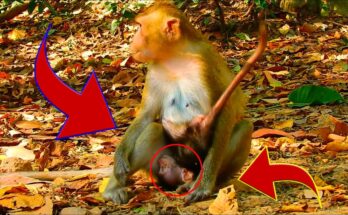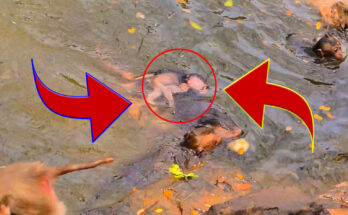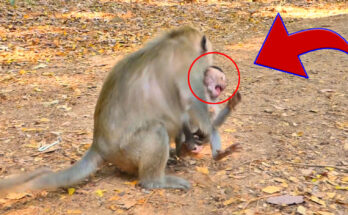The heart-wrenching tale of baby monkeys being taken from their natural habitats and subjected to abuse is one that not only elicits feelings of outrage but also sparks deep questions about human cruelty and the treatment of wildlife. Monkeys, like many other wild animals, are not meant to be commodities for human entertainment or experiments. Unfortunately, they are often victims of human greed, exploitation, and carelessness. But why does this happen? Why are these innocent creatures taken from their homes, abused, and subjected to constant trauma? This question digs deeper into the ethics of human interaction with wildlife, the broader impact of these practices, and what we can do to stop it.
To understand why baby monkeys are taken and abused, it is important to first look at the broader context of animal trafficking and exploitation. Illegal wildlife trade is one of the most prevalent industries responsible for the capture and abuse of baby monkeys. These monkeys, often from endangered species, are taken from their native forests, stripped of their families, and thrown into captivity. The reasons for this illegal trade vary—some monkeys are taken for the pet trade, others for entertainment purposes, and many are subjected to cruel conditions in research laboratories. Regardless of the reason, these animals face a life of unimaginable suffering.
For many species, the process of being taken from the wild is brutal. Baby monkeys, in particular, are targeted because they are often seen as more appealing due to their innocent appearance and small size. These babies are typically captured by poachers who may use horrific methods to separate them from their mothers, which can include shooting the mother, poisoning her, or even capturing the baby while the mother fights to protect it. Once captured, the baby monkeys are sold to various buyers, where their suffering continues.
One of the most disturbing aspects of the abuse these animals endure is the fact that they are often used in entertainment. Baby monkeys are forced into performing in circuses, street shows, and tourist attractions. Their training methods are harsh, using fear, punishment, and deprivation to force them to obey commands. In many instances, these monkeys are subjected to physical pain, kept in cramped, unsanitary cages, and denied any form of proper nutrition. Their natural instincts are suppressed, and they are forced to live in environments that are utterly foreign to their needs. As a result, they often suffer from psychological trauma, including anxiety, depression, and aggression.
In addition to entertainment, many baby monkeys are taken for research purposes. In laboratories around the world, these animals are subjected to inhumane experiments that cause them extreme physical and emotional pain. They are often subjected to invasive procedures such as brain surgery, exposure to harmful substances, and psychological testing that leaves them scarred. The issue of animal testing is controversial, and while some argue that it is necessary for medical advancement, others maintain that it is an ethical violation that causes immense suffering to sentient beings.
The root causes of these offenses against baby monkeys are complex. A large part of the problem lies in the demand for exotic pets and the desire for novelty and entertainment. People who buy these animals often do not understand the toll it takes on the monkey, both physically and mentally. They may not realize that a baby monkey is a wild animal with natural instincts that cannot be suppressed for long without causing harm. In some cases, monkeys end up being abandoned or dumped when they grow too large, too aggressive, or too difficult to care for.
Another reason for the abuse of these animals is the lack of enforcement of wildlife protection laws. In many regions, illegal wildlife trade continues unchecked due to corruption, weak law enforcement, or insufficient funding for conservation efforts. Even when laws are in place to protect monkeys and other wildlife, those involved in trafficking often find ways to evade detection, making it difficult to stop the cycle of abuse.
The exploitation of baby monkeys is an issue that calls for immediate action. Conservation efforts, stronger legal protections, and greater public awareness can make a significant difference. Governments must enforce stricter regulations on wildlife trafficking, increase penalties for those who violate these laws, and ensure that resources are available to protect animals from poachers and traffickers. Furthermore, public education plays a vital role in changing attitudes toward wild animals. People need to be made aware of the suffering that these animals endure when they are taken from the wild, and the long-term consequences of their exploitation.
In conclusion, the abuse and exploitation of baby monkeys is a deeply troubling issue that demands attention. These animals are innocent beings that deserve to live freely in their natural habitats, not to be taken from their homes and subjected to constant abuse. Through stronger laws, greater awareness, and a collective shift in how we view wildlife, we can work to end the suffering of these animals and ensure that future generations of monkeys are protected from harm. It is a moral responsibility for all of us to advocate for those who cannot speak for themselves.


